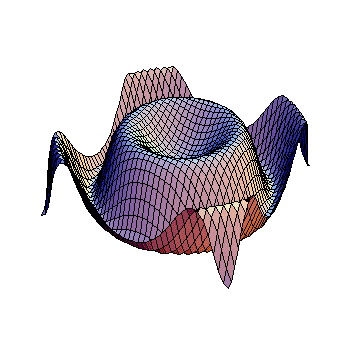#HCl# is a strong acid in water as well as in it's natural gaseous form, which means in a solution every molecule is ionized, whereas HF is a mild acid so in a solution there's some of it ionized and some it as HF.
The equations
#HCl rarr H_((aq))^+ + Cl_((aq))^-#
#HF harr H_((aq))^+ + F_((aq))^-#
This is partly because #Cl^-# is a very stable ion - it has a complete octet for instance - , so when it breaks away from the molecule it can stay that way.
While the same could apply to #F^-# for the same reasons, fluorine is very electronegative and as such the bond fluorine makes with the proton has a tendency to be restored.
In water, the only other strong acids are #HBr#, #HI#, #HNO_3# and the first proton of #H_2SO_4#.



